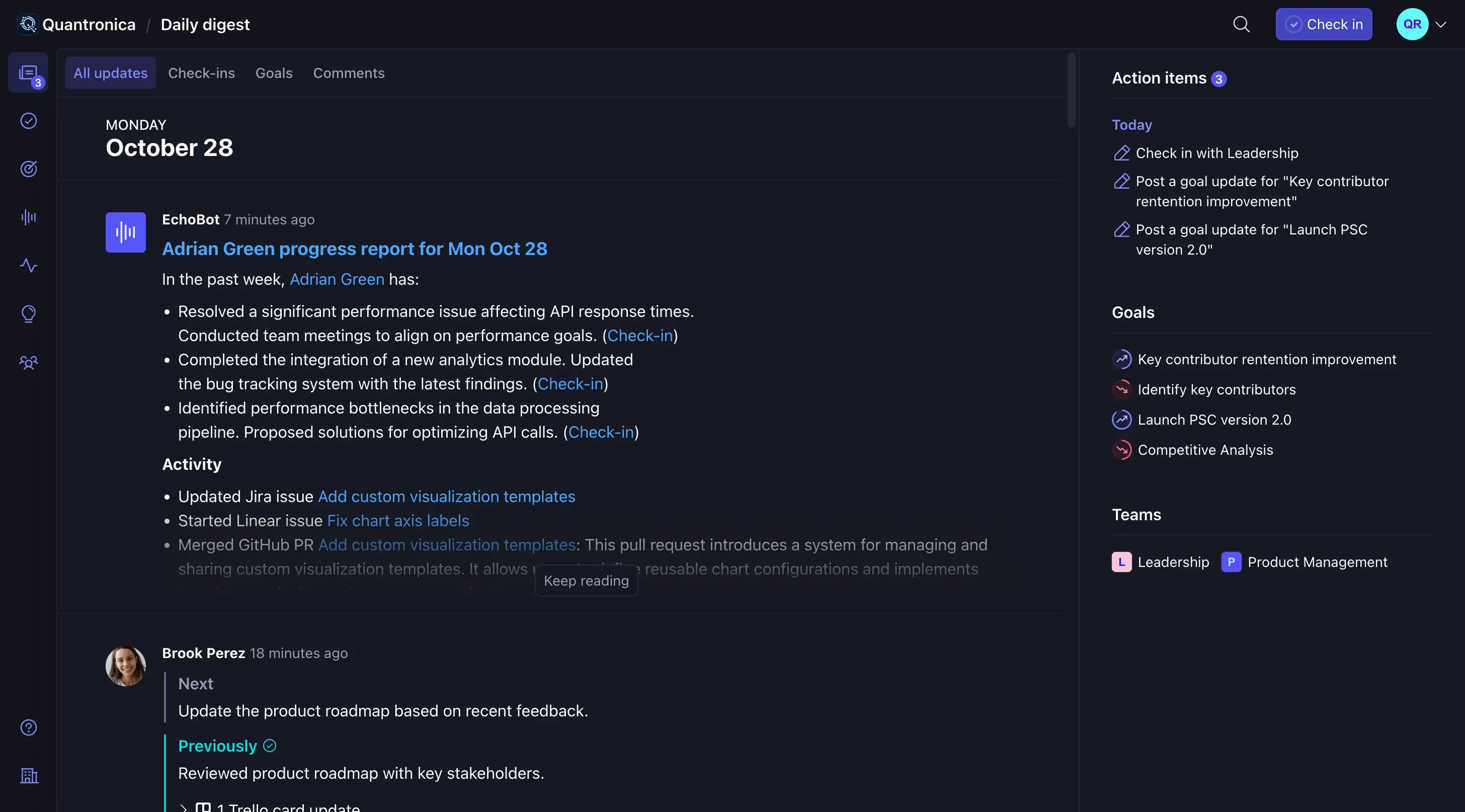Steady’s core mission is to cut the coordination tax for every person, on every team. Part of how Steady does that is by automating personal context assembly. So instead of the tedious daily routine of attending a slate of meetings, triaging dozens of chat threads, emails, and issues, and tapping shoulders to build a complete understanding of what’s going on, you just read your Daily Digest in Steady.
To date, the personal part of “automatic personal context assembly” has largely been based on the organizational structure of your team; you only get content in your Daily Digest from teams you’re on, goals you’re involved in, or updates you intentionally subscribe to.
But with the emergence of large language models, we saw a massive opportunity for us to double down on truly personalized context — tailored to the exact needs of person’s specific role — by giving people exactly the context they need, exactly when they need it, automatically. The end result of that is a brand new feature for Steady we’re calling Echoes.
How Echoes works
Echoes is all about automatic context assembly for anything you want to stay up to speed on. Let’s use an example of an extremely common, time consuming task for managers; prepping for a 1:1 with a direct report.
Start with a simple question “What did Jane D work on last week?”, set the cadence to “weekly”, and set the delivery time to 15 minutes before the scheduled 1:1.
Your new Echo agent takes it from there, delivering a fresh answer to your Daily Digest in Steady week after week that summarizes everything that happened across check-ins, goal updates, and all of your integrated tools. Everything you need to have a productive 1:1 without wasting valuable time on getting up to speed.

And of course, you don’t have to limit yourself to simple questions or prompts. If you just want big picture highlights, Echoes can do that. If you want to exclusively surface the pull requests that person has worked on, you can do that. If you want the response in the form of a poem, you can do that too. Exactly the context you need, exactly when you need it, automatically.
Use cases
Echoes is incredibly useful for meeting prep, but that’s just the tip of the iceberg. Here’s a few more examples of how you can use Echoes.
Get a bird’s eye view of what shipped
Let’s say you’re an engineering manager on a busy team, and you need to keep tabs on everything that’s going out the door. Use a simple prompt like “list all the Github pull requests that were merged in the last 2 weeks” and set the cadence for every other week. Echoes will deliver a complete list of everything that’s been shipped, and include a summary of the changes for each PR. No digging through Github, no having to ask for updates.
Get alerted when goals start to slip
No manager likes to learn that their team won’t hit a goal until it’s too late. Write a prompt like “list any goals that are slipping, and summarize why”, and Echoes will review all of the goals you have access to, find the the ones that are slipping, and analyze the updates to give you a summary. Set the delivery time for every Monday, and never be caught off guard again.
Break down cross-functional silos
Let’s say you work on the marketing team. You need to know at a high level what the product team is working on, but wading through Jira takes too much time. Echoes to the rescue. Write a prompt like “give me a high-level summary of what the Design and Development teams worked on last week", and Echoes will put all the pieces together for you. No noise, no having to regularly dig through domain-specific tools to stay informed.
Safe, trustable AI
A great tool isn’t useful if you can’t use it within your organization for security, compliance, or trust reasons. We built Echoes around 4 core principles to address these concerns:
- No training on your data, ever. We use enterprise-grade vendors to generate answers for Echoes, with contractual agreements to never use your data for training purposes. We’re in the coordination business, not the model-making business.
- No permission leaks. Echoes can only access the data that people already have access to in Steady. There’s zero risk of people seeing content they shouldn’t.
- Human-sourced inputs. Unlike AI search tools that try to assemble answers from noisy data sources like Slack, Notion, email, etc. without the benefit of authoritative context, Echo answers are grounded against “boots on the ground” human intentions summaries. The difference in answer quality and trustworthiness is night and day.
- Answers you can audit. Answers include links to the source material used to create them. You can always audit answers to verify that they’re correct.
Pricing and rollout
We initially planned on rolling out Echoes as a paid add-on, but the more we used it, the more we couldn’t imagine Steady without Echoes. We’ve also seen how the market has reacted to the add-on approach, particularly those with lopsided value propositions that often double the per-seat price, but certainly do not double the value returned to customers.
With all that in mind, we’re making Echoes free for every Steady account. It’s a core feature, just like Smart Check-ins and Live Goals. Echoes is available now for new accounts, and we’re rolling it out to existing accounts over the next few weeks.
Note that Echoes won’t be included on a small subset of legacy Status Hero plans. You can upgrade to a Steady plan here. If you’d like to learn more first, reach out. We’re happy to give you a demo and discuss your specific needs.

